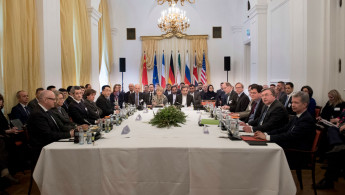European MPs urge US not to scrap Iran nuclear deal
About 500 lawmakers from Germany, France and Britain on Thursday urged the US Congress to support the Iran nuclear deal which President Donald Trump has threatened to abandon.
"It is the US's and Europe's interest to prevent nuclear proliferation in a volatile region and to maintain the transatlantic partnership as a reliable and credible driving force of world politics," the MPs wrote.
The landmark 2015 deal was a "major diplomatic breakthrough" that had halted the imminent threat of a nuclear-armed Iran, MPs from the parliaments of the three European signatory countries said.
"We were able to impose unprecedented scrutiny on the Iranian nuclear programme, dismantle most of their nuclear enrichment facilities and drastically diminish the danger of a nuclear arms race," they wrote.
"Not a drop of blood was spilt."
Scrapping the agreement would result "in another source of devastating conflict in the Middle East and beyond," they warned in an open letter published in several newspapers.
Trump has derided the deal as a capitulation to Tehran and has declared it no longer is in the US interest to maintain the sanctions relief his predecessor Barack Obama granted Iran in return for controls on its nuclear programme.
He has demanded that US lawmakers and European allies fix "disastrous flaws" in the deal or face a US exit, possibly as early as next month.
The MPs warned that ending the deal would spell "lasting damage to our credibility as international partners in negotiation, and more generally, to diplomacy as a tool to achieve peace and ensure security."
French President Emmanuel Macron and German Chancellor Angela Merkel will both travel to Washington next week on separate official visits, in part to lobby Trump on the Iran issue.
On Monday, EU foreign ministers discussed ways to ensure the US would not pull out of the nuclear deal, but stopped short of agreeing to new sanctions on Tehran.
Danish Foreign Minister Anders Samuelson said there was "a very broad majority" in favour of expanding sanctions.
Simon Coveney, the Irish foreign minister, said there was a need to "send a strong signal to Iran that we're concerned in relation to some of their activity particularly in Syria". "But also to send a message to Washington that we share their concerns in some of those areas," he added.
Any decision on sanctions requires unanimous approval from all 28 EU states and several, including Italy and Sweden, are not convinced about new measures.
But German Foreign Minister Heiko Maas said the question of expanding sanctions would "remain on the agenda" in the coming weeks.
Earlier this month, Iran said the US will "regret" violating the nuclear deal and that the country would respond "within a week" should that happen.





 Follow the Middle East's top stories in English at The New Arab on Google News
Follow the Middle East's top stories in English at The New Arab on Google News
![Israeli forces ordered bombed Gaza's Jabalia, ordering residents to leave [Getty]](/sites/default/files/styles/image_330x185/public/2176418030.jpeg?h=a5f2f23a&itok=_YGZaP1z)

